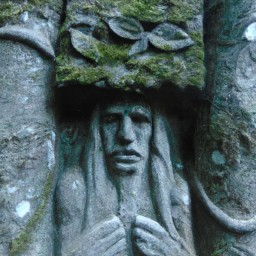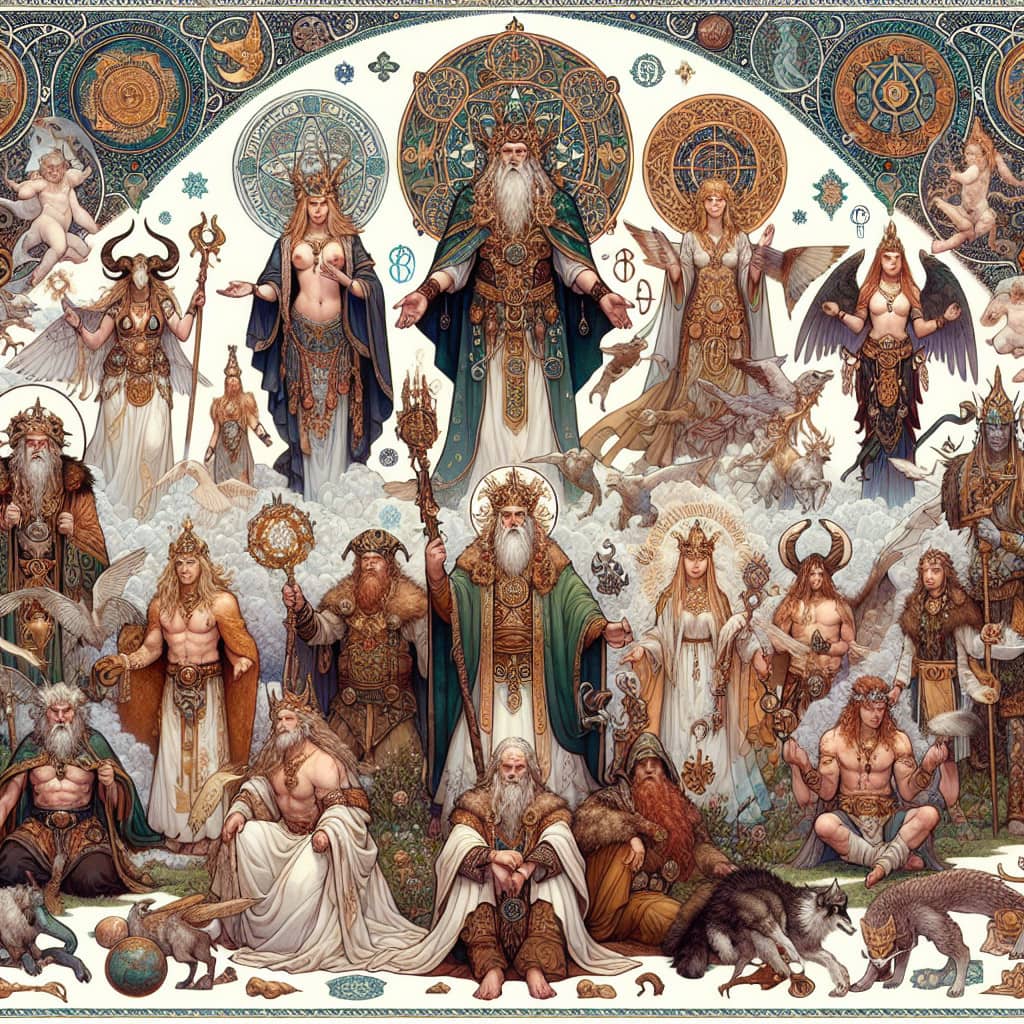The ancient Germanic people were known for their reverence of many gods and goddesses. These gods and goddesses were collectively known as the German Pagan Gods. Worship of these gods and goddesses was an integral part of Germanic culture, and many of their beliefs and traditions still remain today. In this article, we will explore who these German Pagan Gods were, their individual roles, and how they were worshipped. We will also discuss how these gods and goddesses have influenced modern day beliefs and practices.
The Germanic pantheon of gods contained a wealth of characters and creatures that made up the mythological world of the ancient Germanic people. From the gods of war to the gods of fertility and nature, the Germanic pantheon contained a wide variety of gods and goddesses. In this article, we will explore some of the most important and interesting gods and goddesses of the Germanic pantheon.
Odin
Odin was the ruler of the Aesir, the principal gods in the Germanic pantheon. He was the god of war, death, wisdom, and poetry. Odin was also associated with magic and sorcery, and was said to be able to shape-shift into different forms. Odin was a complex and powerful deity, and is often seen as the leader of the gods.
Thor
Thor was one of the most powerful gods in the Germanic pantheon. He was the god of thunder and lightning, and was said to wield a powerful hammer that could cause lightning to strike down his enemies. Thor was a protector of the Aesir, and was often seen as a symbol of strength and courage.
Freyja
Freyja was the goddess of love, fertility, and beauty. She was associated with the Vanir, a group of fertility gods in the Germanic pantheon. Freyja was a beloved goddess, and was said to have the power to grant wishes and to grant boons to her worshippers.
Freyr
Freyr was the brother of Freyja, and was the god of fertility and prosperity. He was associated with the Vanir, and was said to be a powerful and generous god. Freyr was said to have the power to bring peace and abundance to his worshippers.
Loki
Loki was a trickster god who was associated with both the Aesir and the Vanir. He was said to be a master of deception and manipulation, and was often seen as a mischievous and cunning god. Loki was also known for his love of chaos and destruction, and was often seen as an unpredictable and dangerous character.
Idun
Idun was the goddess of youth and immortality. She was associated with the Aesir, and was said to be the keeper of the magical apples of youth. Idun was said to have the power to grant eternal youth to those who ate her apples.
Hel
Hel was the goddess of the underworld, and was associated with death and the afterlife. She was said to be a ruler of the underworld and a keeper of the dead. Hel was often seen as a dark and frightening figure, but she was also said to be a compassionate and caring goddess.
Tyr
Tyr was the god of justice and law, and was associated with the Aesir. He was said to be a brave and noble god, and was often seen as a symbol of courage and honour. Tyr was also associated with warfare, and was said to be a powerful and wise warrior.
Frigg
Frigg was the wife of Odin and the queen of the Aesir gods. She was the goddess of love, marriage, and fertility, and was said to be a powerful and wise goddess. Frigg was often seen as a protector and guardian of her people, and was said to be a source of great strength and courage.
Vali
Vali was the son of Odin and Frigg, and was said to be a god of vengeance and justice. He was associated with the Aesir, and was said to be a powerful and fierce warrior. Vali was often seen as a symbol of strength and courage, and was said to be a great protector of the gods.
Balder
Balder was the son of Odin and Frigg, and was the god of light and purity. He was said to be a kind and gentle god, and was often seen as a symbol of love and beauty. Balder was also associated with peace and harmony, and was said to be a protector of the gods and goddesses.
Forseti
Forseti was the god of justice and arbitration, and was associated with the Aesir. He was said to be a wise and just god, and was often seen as a symbol of fairness and justice. Forseti was often invoked in court cases to ensure a fair outcome for all parties involved.
Heimdall
Heimdall was the guardian of the Bifrost bridge, the bridge between the worlds of the gods and the mortals. He was said to be a powerful and vigilant god, and was often seen as a symbol of protection and vigilance. Heimdall was also said to be able to hear the slightest whisper and see the faintest light.
The Germanic pantheon of gods was full of powerful and fascinating characters. From the gods of war to the gods of fertility and nature, the gods of the Germanic pantheon have been a source of awe and inspiration for thousands of years. Whether you are looking for a god of justice, a goddess of love, or a trickster god of chaos, the Germanic pantheon of gods has something to offer.
The German pagan gods have a long and complex history, spanning many centuries and cultures. They have played an important role in the development of German culture, language, and religion. While they are no longer worshipped, they remain an important part of the German identity. It is important to remember these gods and their stories, as they help to shape the culture and history of Germany. We can learn a lot from the gods of German paganism, and their stories will continue to be told for generations to come.





